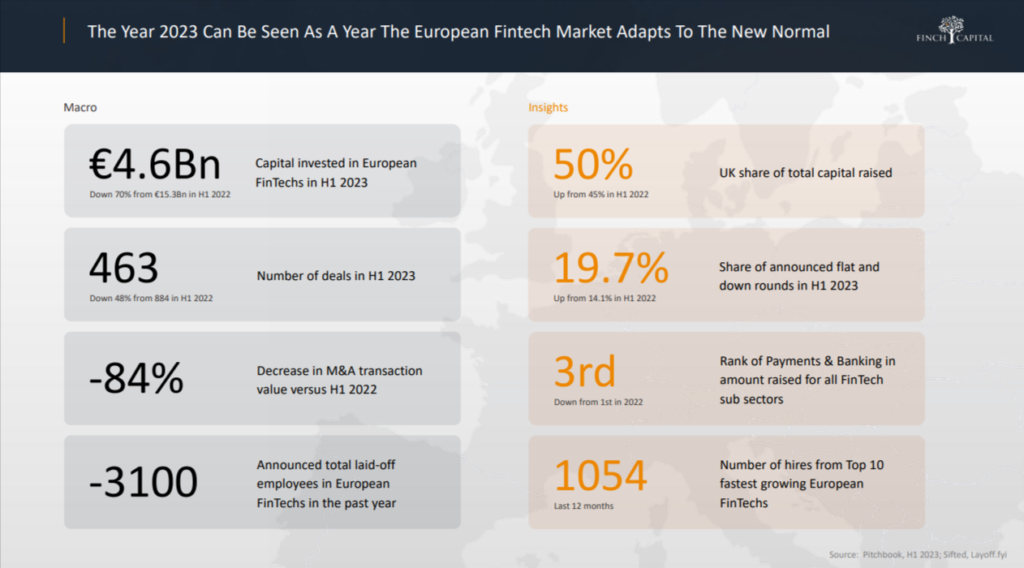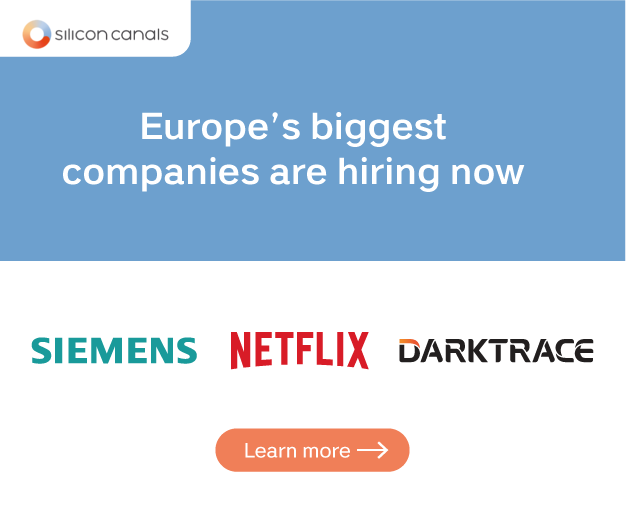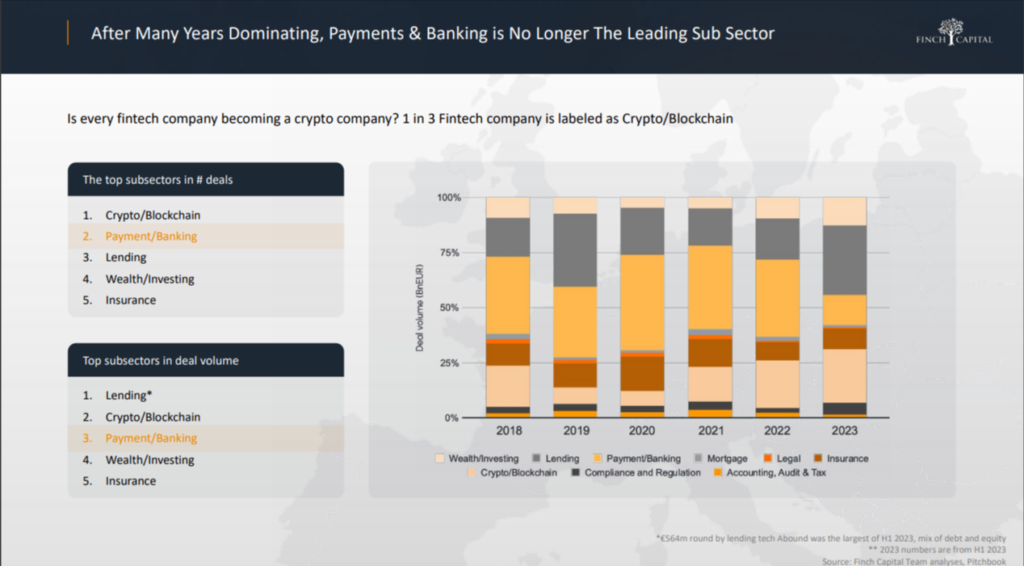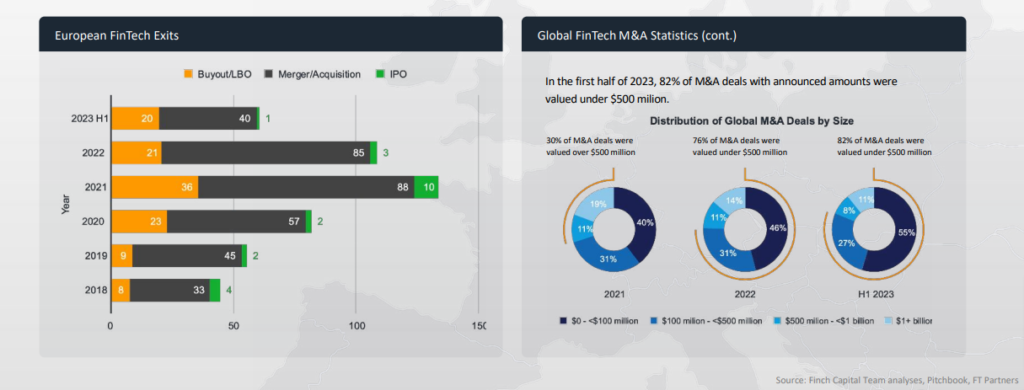Image credits: aallm/DepositPhotos
The European Fintech ecosystem, once characterised by rapid growth and abundant investment, has experienced significant shifts and challenges in 2023.
To gauge and evaluate the European Fintech ecosystem, Finch Capital has come up with its 8th State of European FinTech Report.
The 2023 edition of the report informs about a range of topics impacting the fintech industry, including where the sector is currently, the impact of the investment environment, and other trends.
Here are the key takeaways:

Impacted by the new funding environment
The report reveals that in the first half of 2023, European Fintech companies raised €4.6B in capital, a staggering 70 per cent decrease from the €15.3B raised in the same period in 2022.
Notably, the top 20 funding rounds, which once (in 2021 and 2022) accounted for 50 per cent of the market, now represent over 60 per cent of total deal volume, even as their sizes have shrunk.

This has squeezed the long tail of deals outside the top 20 and companies in the Series A to C stages have felt the brunt of this transformation, adds the report.

According to the report, Payments, traditionally a resilient category, has experienced a surprising decline in investment, while the crypto sector has flourished.
The report indicates that the UK has defied the trend, increasing its share of total funding to 50 per cent, up from 45 per cent, even as US-based investors have become less active.
The report further adds that US-based investors who were active in these markets have also taken a step back.
For instance, in 2021, there were 3 US-based firms in the top 5 investors in the UK, while in 2023, there were none, reveals the report.
Valuations in both public and private markets have retreated to 2019 levels after a period of extraordinary growth in 2020-2021.
Later-stage valuations, in particular, have seen substantial drops of up to 50 per cent, while earlier-stage valuations have remained relatively stable. Encouragingly, valuations began to stabilise in the first half of 2023 after hitting their low point in December 2022.
There is hope for the ecosystem though, as valuations stabilised in the first six months of 2023 from their low in December 2022, adds the report.

Exit market remains resilient
Despite the overall funding decline, the exit market remains relatively resilient with M&A activity only down by 5 per cent, reveals Finch Capital’s report.
However, M&A transaction sizes have shrunk by 84 per cent, posing challenges for larger transactions.
Public markets have remained closed due to bottomed-out valuations, but there is hope that 2024 could bring new opportunities for Europe’s highest-valued companies to exit.
This is all against a backdrop of the M&A market seeing large outcomes decline considerably, with less than 19 per cent of all deals valued over $500M and venture funding with ‘megarounds’ in particular declining back to the 2019 level.
Fight for profitability
The fight for profitability became a central focus in the past year leading to more than 3,000 announced layoffs across the industry.
Despite these challenges, the fintech sector continued to hire, particularly among the ten fastest-growing fintech companies, which collectively added 1,050 employees in the past year.
It reflects a shift towards a more competitive landscape, with some companies prioritising junior positions while letting go of senior sales personnel.
Key European markets and B2B fintech
A review of key European countries showcased varying degrees of resilience in the face of the funding decline. The UK, in particular, stood out, accounting for over 50 per cent of the total funding in Europe.
Other regions, like the Nordics, Poland, and France, held up reasonably well due to significant crypto funding rounds.
However, reliance on local early-stage investors became more pronounced, resulting in a lengthening of the time it takes to secure funding.
The Netherlands Fintech sector has experienced a paradoxical situation, with declining deals but rising capital. RegTech has taken the lead, driven by Fourthline’s boost. The Blockchain &
Crypto sub-sector have also been active, representing 35 per cent of total deals.
Ireland’s Fintech market has seen seed deal activity dominate, creating a gap for growth-stage companies. The Lending sub sector has been the most active, accounting for 33 per cent of total deals.
Germany’s Fintech industry has witnessed a decline in funding, particularly in the Lending subsector. However, mature firms have commanded the capital spotlight. The Crypto & Blockchain subsector has been the most active, representing 27 per cent of total deals.
Funding in the French Fintech sector has also experienced a slowdown, but the Ledger and Crypto sub sectors have remained resilient. The Crypto & Blockchain subsector has been the most active, accounting for 29 per cent of total deals.
Spain’s Fintech sector has witnessed a dip in funding, but deal size has increased. The Crypto and blockchain subsector has been the most active, representing 31 per cent of total deals.
The shift from consumer fintech to B2B fintech
A significant trend highlighted in the report is the continued shift from consumer-focused fintech to B2B solutions. Regulatory technology, driven by KYC and AML requirements, is gaining momentum in the B2B sector.
The report anticipates further growth in generative AI applications in retail banking and insurance, emphasising the growing importance of CFOs and the tools they use.
Commenting on the findings Radboud Vlaar, Managing Partner at Finch Capital, says, “Since mid-2022 we have seen an increase in investment discipline in public and private markets, resulting in less funding, lay-offs, less IPOs, flight to quality and focus on capital efficiency. This will continue to be painful for the next 12 months, but will result in a more healthy and sustainable Start-up, Hiring, and Investor ecosystem. ”
“With investors bridging overvalued portfolio startups to bring them to profitability and struggling to find attractive exits in a grossly devalued market, we are likely to see a period of consolidation in the fintech space as many verticals are highly fragmented, creating a smaller but more sustainable ecosystem. We should also start to see a slow recovery of the IPO market in the next semester as valuations have started to slowly pick up and inflation is declining,” he continues.
“Last year’s shake-up with valuations coming down, fundraising slowing down and the exit window closing up, was painful yet necessary. Consolidation and more competitive investment flows, combined with still significant levels of undeployed capital, will bring maturity to the fintech sector. This new normal level of activity demonstrates the refocus of the fintech ecosystem on long-term sustainability versus short-term gains,” concludes Vlaar.
…your recruitment or product development with our curated community partners!




The Most Read
Сryptocurrencies
Bitcoin and Altcoins Trading Near Make-or-Break Levels
Financial crimes
Thieves targeted crypto execs and threatened their families in wide-ranging scheme
Financial crimes
Visa Warning: Hackers Ramp Up Card Stealing Attacks At Gas Stations
News
Capitalism is having an identity crisis – but it is still the best system
Uncategorized
The 73-year-old Vietnamese refugee is responsible for bringing Sriracha to American consumers
Uncategorized
Electric Truckmaker Rivian, Backed By Amazon, Ford, Raises Whopping $1.3 Billion